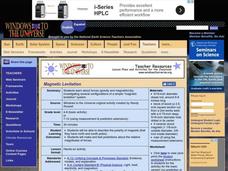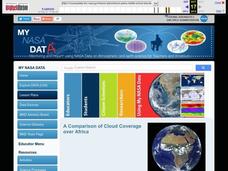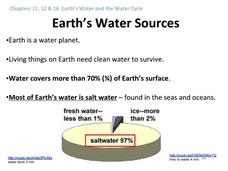Curated OER
Color the Hemispheres
In this Earth's hemispheres and poles activity, students color the North Hemisphere blue and the South Hemisphere red. Students then label the equator, the north pole, and south pole.
International Technology Education Association
Tidy Up Those Sloppy Force Fields!
It is just magnetic. This resource presents the concept of Earth's and another planet's magnetic field and how spacecrafts detect them. Learners study a problem using magnetometers and participate in three experiments to come up with a...
Polar Bears International
Top of the World
Learn about polar bears and the Arctic circle with a instructional activity about the countries and conditions of the region. After examining how the area differs from Antarctica, kids explore climates, animals, and geographical position...
Curated OER
Magnetic Levitation
A thorough investigation of magnetic levitation; this activity has four parts. First, physical scientists play with a wooden dowel and three disc magnets to review polarity and repelling action. Then they experiment with the strength of...
Curated OER
Bank On It! Magnetism
In this science and language arts worksheet, students complete a cloze article. They read a short piece about magnetism and fill in 15 missing words. Word choices are included in a word bank.
Curated OER
Polar Bears
First graders explain what keeps Polar Bears warm in the Arctic by experiencing a layer of blubber to protect them. They read Little Polar Bear by Hans de Beer.
Curated OER
A Comparison of Cloud Coverage over Africa
Students identify different climate regions and local weather patterns. In this cloud coverage lesson students use NASA satellite data and import it into Excel.
NOAA
The Great, Glowing Orb What You Will Do: Make a Solar Heat Engine
How is solar energy able to move wind and water to control the climate? Scholars explore the concept of solar energy in the first of 10 activities in the Discover Your Changing World series. They follow instructions to build homemade...
American Museum of Natural History
Climate Change
It actually is possible to have too much of a good thing when it comes to climate change. A slide show lesson describes how burning fossil fuels contributes to climate change. Individuals read about the scientific process and the...
Curated OER
Astrology: Fact or Fiction?
Students explore the topic of astrology and review the beliefs behind it. They read sample horoscopes. Using a portable digital planetarium, they view the night sky and the zodiac constellations. They examine and discuss the science...
Curated OER
Magnets
Students explore the concept of magnetism. In this magnetism instructional activity, students use bar magnets to conduct experiments regarding magnetism. Students also use a magnetic compasses to examine magnetic poles.
Curated OER
Magnetism
Students investigate magnets. For this magnetism lesson, students begin exploring magnets. Students study attraction and repulsion and discover the poles of a magnet.
Curated OER
Give Me Some Latitude
In this latitude worksheet, students use an atlas or other reference to respond to 4 multiple choice questions about the equator and the poles.
Curated OER
Strange Attractor
Learners explore magnetism. In this magnet activity, students assemble a magnet pendulum. Learners observe the pendulum noting the location of the magnetic poles as they construct the pendulum so that the free-swinging magnet comes as...
Curated OER
Introduction to Earth Sun Relationships Incorporating P.E.
Third graders investigate space science by performing physical activities. In this solar system activity, 3rd graders perform a relay activitiy with their class in which they race between different "planets". Students define space...
Curated OER
Magnetism
All phenomena concerning magnets, their field lines and impact on objects are covered. The trivia surrounding field lines and the earth, electric charges, repulsion and attraction is plentiful. The slide show continues after twenty...
California Academy of Science
Tropical Belt
Where in the world is the equator? Explore a world map with your class, coloring in oceans, continents, and rainforests while locating the three major lines of latitude: the equator, Tropic of Cancer, and Tropic of Capricorn. Discuss how...
Curated OER
Magnet Circus
Learners explore the properties of magnets by designing a device that can move as far as possible using only magnets to move it, and design a machine that will stay in motion for the greatest period of time.
It's About Time
Where are the Volcanoes?
Middle school geologists map the volcanoes closest to themselves, learn about map distortion, and infer possible future volcano locations. A focus on latitude, longitude, and volcanoes beneath the ocean helps connect the lesson.
It's About Time
AC and DC Currents
An informative physics lesson includes two teacher demonstrations, one on AC currents and the other on DC currents, allowing pupils to take notes while watching. The resource includes questions to assign as homework or during class...
National Wildlife Federation
Why All the Wiggling on the Way Up? CO2 in the Atmosphere
The climate change debate, in the political arena, is currently a hot topic! Learners explore carbon dioxide levels in our atmosphere and what this means for the future in the 11th installment of 12. Through an analysis of carbon dioxide...
Curated OER
The Solar System and Beyond
What an inspiring PowerPoint! The color scheme and pictures all contribute to the scientific style of this PowerPoint and will keep the attention of your junior high kids. The diagrams help illustrate the positioning of the moon, sun and...
Curated OER
The Oceans, Waves, Tides & Currents
Your introductory lesson to oceanography can be outlined with this apropos presentation. It touches on the physical features of the ocean floor, waves, tides, and currents. One small issue is that some of the graphics are not of the...
Curated OER
Earth's Water Sources
General facts about Earth's water sources, human use, and the water cycle are outlined by this presentation. Slide three has a grammatical error and slide nine refers to the local watershed of the author, so you will need to make a few...

























